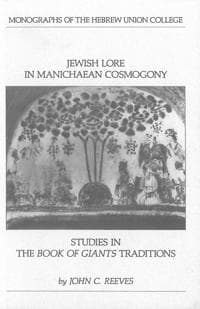
Jewish Lore in Manichaean Cosmogony
518 kr
518 kr
På lager
Ti., 15 april - on., 23 april
Sikker betaling
14 dagers åpent kjøp
Selges og leveres av
Adlibris
Produktbeskrivelse
A work entitled the "Book of Giants" figures in every list of the Manichaean "canon" preserved from antiquity. Both the nature of this work and the intellectual baggage of the third-century Persian prophet to whom it is ascribed remained unknown to scholars until 1943, when fragments of several Middle Iranian versions of the Book of Giants were published by W. B. Henning. Twenty-eight years later, at Qumran, J. T. Milik discovered several copies of a fragmentary Aramaic work which is unquestionably the precursor of the later Manichaean recension. One other important work, Mani's "autobiography," the so-called Cologne Mani Codex, was brought to scholarly attention in 1970 with evidence that Mani spent his youth among the Elchasaites, a Judeo-Christian sect that observed the Sabbath, strict dietary laws, and rigorous purification practices. Although leading Orientalists of the nineteenth and twentieth centuries have consistently stressed the Iranian component in Mani's thought, Reeves argues, in the light of evidence drawn from the above-mentioned discoveries and from a rich panorama of other textual sources, that the fundamental structure of Manichaean cosmogony is ultimately indebted to Jewish exegetical expansions of Genesis 6:1-4. Reeves begins with an examination of the ancient testimonies about the contents of Mani's Book of Giants. Then, using documents from Second Temple Judaism, classical Gnostic literature, Christian and Muslim heresiological reports, Syriac texts, and Manichaean writings, he provides a detailed analysis of both the Qumran and Manichaean rescensions of the work, demonstrating additional interdependencies and suggesting new narrative arrangements. He addresses a series of quotations from an unnamed Manichaean source found in a paschal homily of the sixth-century Monophysite patriarch Severus of Antioch and a narrative from Thoeodore bar Konai. In sum, Reeves demonstrates that the motifs of Jewish Enochic literature, in particular those of the story of the Watchers and Giants, form the skeletal structure of Mani's cosmological teachings, and that Chapters 1 to 11 of Genesis fertilized Near Eastern thought, even to the borders of India and China.
Artikkel nr.
7aa8b0d9-1156-461b-bc1b-3b644677fe45
Jewish Lore in Manichaean Cosmogony
518 kr
518 kr
På lager
Ti., 15 april - on., 23 april
Sikker betaling
14 dagers åpent kjøp
Selges og leveres av
Adlibris
Lignende toppselgere

-10 %
Generic
3-Pak - Fidget Spinners med Sugekopp for Barn
179 kr
Tidligere laveste pris:
199 kr
4,7
mandag, 14 april

Generic
4-Pak - Tesla Senterkopper - Bil Svart/silver
129 kr
4,5
mandag, 14 april

Playstation 5 DualSense Controller Midnight Black
799 kr
4,8
fredag, 11 april

Generic
Øreputer for Bose QuietComfort - QC35/QC25/QC15/AE2 Hodetelefoner Svart
99 kr
4,5
mandag, 14 april

-14 %
Bigstren
Luftrenseenhet - Renser / Saniterer luften - 20,000 mg/h
599 kr
Tidligere laveste pris:
699 kr
4,3
mandag, 14 april

Gardlov
Plenlufter - Piggsko for å lufte plenen
269 kr
4,0
tirsdag, 29 april

KIRKLAND
6x60ml = 360ml - Kirkland Extra Strength 5% Men Hair Regrowth 60ml Hair Loss
1 390 kr
5,0
fredag, 11 april

Global Items
Smart Ørerens med Kamera – Trådløs & Sikker Øreinspeksjon Hvit
299 kr
3,0
onsdag, 23 april

Price Point
Universallader for Garmin klokker Svart
89 kr
4,2
fredag, 11 april

-19 %
INF
INF Tilbehør Xiaomi Roborock S5 Max/S50/S51/S55/S5/S60/S65/S6/S6 Pure/S6 MAXV 22 deler
272 kr
Tidligere laveste pris:
337 kr
torsdag, 10 april
Anbefalinger til dig

-14 %
Generic
HDMI-adapter for PlayStation 2 / PS2
119 kr
Tidligere laveste pris:
139 kr
3,3
mandag, 14 april

-5 %
INF
INF Løkke for 22 mm klokkerem i 10-pakning
71 kr
Tidligere laveste pris:
75 kr
4,5
fredag, 11 april

Generic
4-Pak - Volkswagen VW Senterkopper - Bil 65 mm
129 kr
4,2
mandag, 14 april

-2 %
Generic
Trådløs CarPlay-adapter 2024
449 kr
Tidligere laveste pris:
459 kr
4,3
mandag, 14 april

Toppik
Toppik - 27,5g - Dark Brown - Mørkebrun
285 kr
4,1
fredag, 11 april

Price Point
Fjernkontroll til Apple TV 4K/Gen 1/2/3/4/HD
179 kr
4,2
fredag, 11 april

INF
INF Sett med hånd- og fingertrener 5 deler
219 kr
3,7
torsdag, 10 april

INF
INF Filter for MSPA oppblåsbare bassenger FD2089 4-pakning
299 kr
4,7
torsdag, 10 april

Pro
Digital vekt - lommevekt, smykkevekt 0,01 - 200g
119 kr
4,3
onsdag, 9 april

Goal Zero
Goal Zero 36110, POWER STATION YETI 500X, 600w, 505Wh - EU plug
1 799 kr
4,0
tirsdag, 8 april